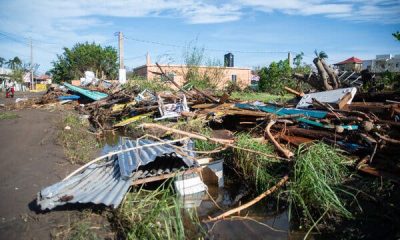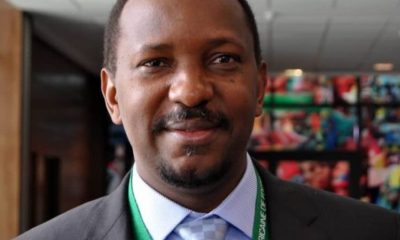OPINION
When Will Nigeria Be Allowed To Breathe

BY ISAAC ASABOR*
There is no denying that Nigeria, a nation rich in culture and diversity, has faced numerous challenges over the last decade. Extremist insurgencies and clashes between herders and farmers threaten the country’s stability.
When delving into the five major security threats that have shaped Nigeria’s recent history, it is worth noting that President Muhammadu Buhari promised to defeat Boko Haram during his election in 2015, but the former president has yet to deliver on that promise. The Islamist militant group, once thought to be “technically” defeated, has expanded its reach despite poverty, ungoverned spaces, and extremist ideologies fuelling its insurgency.
To make matters worse, Boko Haram’s splinter faction, the Islamic State’s West Africa Province, has grown to rival its parent group in size and capacity. Both continue to resist military action.
Climate change and desertification have also exacerbated violent conflicts between nomadic herders and settled farmers. As herders head south in search of pasture, clashes over land, water, and grazing routes have claimed thousands of lives. For example, Benue State, in the heart of Nigeria, has seen some of the most deadly attacks in this ongoing conflict.
When viewed against the backdrop of an economic downturn, Nigeria is undeniably a country in crisis.
Nigeria is facing its worst economic crisis in decades. Inflation is hovering around 30%, and food prices have risen by 35%. The COVID-19 pandemic exacerbated existing problems, resulting in capital outflows, low oil prices, and declining remittances.
Insurgency attacks have undoubtedly claimed thousands of lives since 2015. Millions of people have been forced to leave their homes, leaving scars on families and communities, and security concerns have disrupted economic activity, limiting farmers’ access to their land.
It is not an exaggeration to say that with each attack, trust in Nigeria’s democracy dwindles, leaving citizens yearning for effective governance, accountability, and long-term solutions to security threats.
Despite his lofty promises, former President Muhammadu Buhari left Nigeria’s economy and sociological tapestry in a quagmire, leaving his successor, President Bola Ahmed Tinubu, facing more complex challenges than he did.
Given the foregoing, it is not an exaggeration to say that Nigeria has been falling into one major challenge after another over the past few years. It has faced a nagging challenge every year since 2015. It has not had much time to breathe in recent years.
For example, it implemented its first round of lockdowns in March 2020 to help combat the spread of COVID-19. The lockdown continued until May 2020. The foregoing came as former President Muhammadu Buhari announced a gradual easing of the five-week lockdown in the Federal Capital Territory (FCT), Lagos, and Ogun State, with a nationwide night curfew from May 4 to 17. Despite the challenges, Nigeria’s response to the pandemic has been commendable, with fewer deaths attributed to factors such as a warmer climate, a younger population, and previous experience dealing with epidemics like Ebola.
To put it mildly, it is not an exaggeration to say that as Nigerians were literarily recovering from the wounds inflicted by a bad economy and bad governance, another challenge known as EndSARS reared its ugly head. The EndSARS Movement was primarily active in 2020. It was a decentralised social movement and a series of large-scale protests against police brutality in Nigeria.
The movement demanded the disbandment of the notorious Special Anti-Robbery Squad (SARS), a Nigerian Police unit known for its long history of abuse against Nigerian citizens. Young Nigerians from all six geopolitical zones came together to end police intimidation, oppression, and brutality. The protests drew global attention and solidarity, with widespread outrage on social media and demonstrations in major cities across the country. Amid the country’s unprecedented hardship, the movement expanded to include demands for good governance and accountability.
In a similar vein, Nigerians experienced a cash crunch from October 2022 to April 2023. Nigeria’s Central Bank (CBN) implemented a confusing currency redesign, phasing out old ₦200, ₦500, and ₦1000 notes. The abrupt decision depressed commerce and resulted in a significant drop in productivity levels.
Without a doubt, 2023 was a year of turbulent elections, controversies, and unimaginable hardship for millions of Nigerians. The prohibitive cost of essential commodities left many struggling to survive, and as we enter 2024, there is no denying that virtually all Nigerians have experienced no improvement in terms of standard of living and cost of living, as it is clear that the government has yet to take decisive action and provide Nigerians with enough reasons to smile.
In fact, since the emergence of President Bola Ahmed Tinubu’s government, the increase in petroleum product prices and the drastic loss in the value of the naira have eroded the purchasing power of most Nigerians, forcing the best minds to succumb to the “Japa syndrome,” as they seek greener pastures elsewhere. Those who remain are gasping for air, undoubtedly caught in the vice grip of economic hardship and insecurity.
Given the bleak socioeconomic situation depicted in this context, the question “When Will Nigeria Be Allowed To Breathe?” is not a misnomer. The answer to the question cannot be farfetched because it lies at the core of prudent policies.
For Nigeria to breathe again, many Nigerians are pleading with President Bola Ahmed Tinubu and all political leaders to prioritise policies that alleviate suffering.
To begin, Nigerians are requesting policies to reduce the high cost of food, which is critical, especially since many families have been forced to choose between a meal and survival.
In a similar vein, the burden of transport costs is currently weighing heavily on citizens, even though efficient public transport systems and low fares are critical. Thus, against the backdrop of the foregoing, Nigerians are poised to hold the current crème de la crème of leaders accountable through a series of protests across the country scheduled to take place from August 1 to 10, 2024.
Youth employment has also been requested, which can be achieved through job creation; idle hands breed frustration, whereas gainful employment offers hope.
Given the foregoing demands, it is appropriate to urge President Tinubu, state governors, and legislators to set a good example, which can be accomplished through prudent living. And it is possible to achieve this by lowering the high cost of governance. In a similar vein, the government should avoid extravagant spending.
Similarly, the government should avoid unnecessary travel and instead focus on impactful travel that benefits the people, rather than travel undertaken solely for political reasons.
Without exaggeration, Nigeria deserves better. As a result, it is appropriate for our leaders to rewrite government narratives for the benefit of Nigeria as a whole and Nigerians in particular. Indeed, our leaders should initiate and implement policies that allow Nigerians to breathe freely, both physically and economically, and that are urgently required. The demands listed above are unquestionably possible with political will, and we can build a nation in which every citizen thrives if we work together. Regardless, many Nigerians are asking, “When Will Nigeria Be Allowed To Breathe?”.
-
CRIME4 years ago
PSC Dismisses DCP Abba Kyari, To Be Prosecuted Over Alleged $1.1m Fraud
-
FEATURED4 years ago
2022 Will Brighten Possibility Of Osinbajo Presidency, Says TPP
-
FEATURED2 years ago
Buhari’s Ministers, CEOs Should Be Held Accountable Along With Emefiele, Says Timi Frank
-
BUSINESS & ECONOMY2 years ago
Oyedemi Reigns As 2023’s Real Estate Humanitarian Of The Year
-
SPORTS2 years ago
BREAKING: Jürgen Klopp Quits Liverpool As Manager At End Of Season
-
SPORTS2 years ago
Could Liverpool Afford Kylian Mbappe For €200 million? Wages, Transfer Fee
-
ENTERTAINMENT2 years ago
Veteran Nigerian Musician, Basil Akalonu Dies At 72
-
FEATURED2 years ago
Tribunal Judgement: Peter Obi Warns Of Vanishing Electoral Jurisprudence, Heads To Supreme Court
-
BUSINESS & ECONOMY2 years ago
Oyedemi Bags ‘Next Bulls Award’ As BusinessDay Celebrates Top 25 CEOs/ Business Leaders
-
FEATURED4 years ago
2023 Presidency: South East PDP Aspirants Unite, Demand Party Ticket For Zone



































